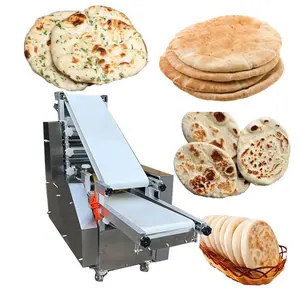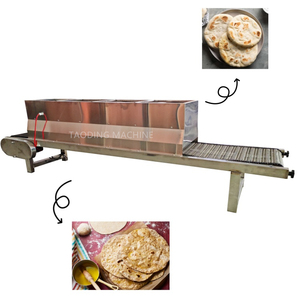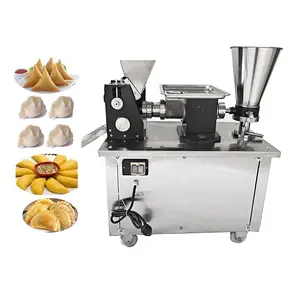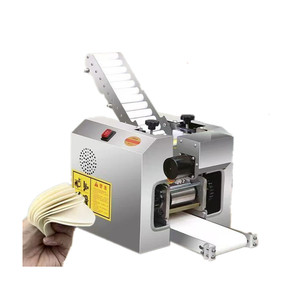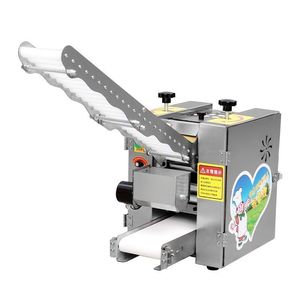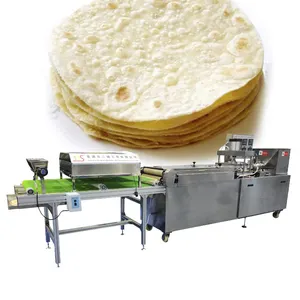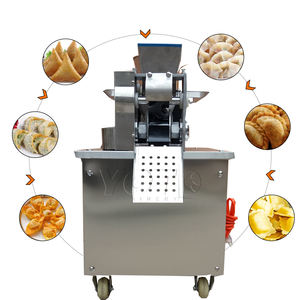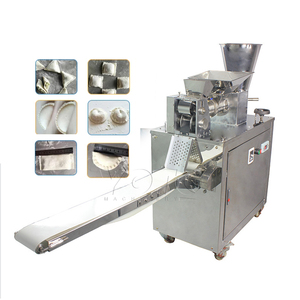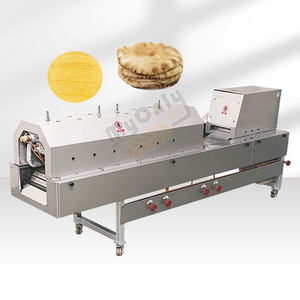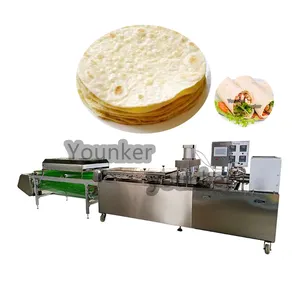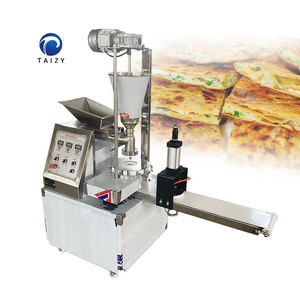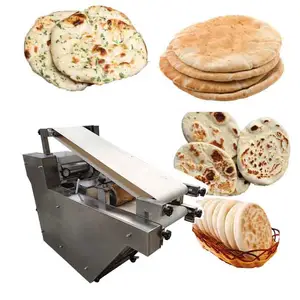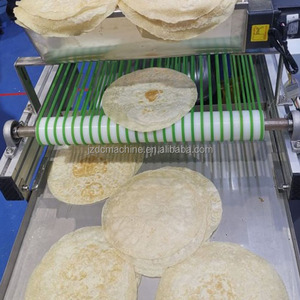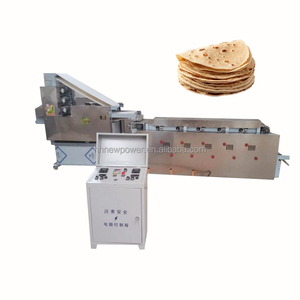Paratha Making Machine Fully Automatic




 1/3
1/3




 1/13
1/13


 CN
CN



 1/18
1/18




 1/20
1/20




 1/13
1/13







 1/16
1/16




 1/18
1/18





 1/29
1/29

 CN
CN



 1/16
1/16




 1/4
1/4



 1/18
1/18


About paratha making machine fully automatic
Where to Find Paratha Making Machine, Fully Automatic Suppliers?
China remains the central hub for fully automatic paratha making machine manufacturing, with key production clusters in Henan and surrounding provinces. These regions host vertically integrated supply chains that support rapid prototyping and large-scale production of grain-based food processing equipment. Henan, in particular, is home to a dense network of electromechanical and stainless-steel fabrication facilities, enabling localized sourcing of motors, heating elements, molds, and control systems—critical components in automated roti and paratha machines.
The industrial ecosystem supports both standard and customized configurations, with many suppliers operating end-to-end production lines capable of assembling 50–200 units per month. Proximity to raw material suppliers reduces component lead times by up to 40%, while established logistics corridors facilitate export readiness. Buyers benefit from consolidated manufacturing zones where design, machining, assembly, and testing occur within compact geographic radii, ensuring faster time-to-market and scalability for bulk orders.
How to Choose Paratha Making Machine, Fully Automatic Suppliers?
Effective supplier selection requires a structured evaluation across technical, operational, and transactional dimensions:
Technical Specifications & Compliance
Verify that suppliers adhere to international electrical and food safety standards. Look for CE marking or equivalent certifications indicating compliance with voltage, insulation, and thermal regulation requirements. Machines should operate safely within 220V–380V ranges and feature overheat protection, adjustable temperature controls (typically 150°C–300°C), and food-grade contact surfaces (e.g., SUS304 stainless steel). Request documentation on motor specifications (power output: 1.5–3kW), pressing mechanisms, and cycle times (average: 3–6 seconds per paratha).
Production and Customization Capability
Assess supplier flexibility in accommodating design modifications:
- Adjustable thickness (0.5–5mm) and diameter (15–30cm) settings
- Interchangeable molds for round, square, or patterned parathas
- Customizable output capacity (100–1,200 pieces/hour)
- Options for color, logo printing, plug type, and power cable length
Confirm whether customization is supported through in-house engineering teams and CNC tooling infrastructure.
Quality Assurance and Delivery Performance
Prioritize suppliers demonstrating consistent on-time delivery (target ≥97%) and responsive communication (response time ≤3 hours). Cross-reference performance tags with order history where available. A reorder rate below 15% may indicate limited repeat business, suggesting room for improvement in post-sale support or product reliability. Evaluate warranty terms (typically 12 months) and availability of technical troubleshooting support.
What Are the Best Paratha Making Machine, Fully Automatic Suppliers?
| Company Name | Type | Online Revenue | On-Time Delivery | Avg. Response | Reorder Rate | Price Range (USD) | Min. Order | Customization |
|---|---|---|---|---|---|---|---|---|
| Jiaozuo Taoding Trading Co., Ltd. | Multispecialty Supplier | $540,000+ | 97% | ≤2h | <15% | $980–2,450 | 1 set | Yes |
| Luohe Juyou Commercial & Trading Co., Ltd. | Custom Manufacturer | $460,000+ | 97% | ≤3h | <15% | $158–6,500 | 1 set | Yes |
| Qixian Xincheng E-Commerce Co., Ltd. | E-commerce Trader | $4,000+ | 100% | ≤1h | <15% | $323–531 | 1 dozen | Limited |
| SSS Hardware International Trading Co., Ltd. | Multispecialty Supplier | $800+ | 50% | ≤6h | <15% | $4,100–50,000 | 1 set | Yes |
| Yongtao Group (Henan) Co., Ltd. | Trading Group | Not disclosed | - | ≤4h | - | $450–750 | 1 piece | Limited |
Performance Analysis
Jiaozuo Taoding and Luohe Juyou represent balanced options with strong revenue performance, high on-time delivery rates, and broad customization capabilities. Their price bands cater to mid-tier commercial buyers seeking reliable automation without excessive capital outlay. Qixian Xincheng stands out for responsiveness (≤1h) and cost-effective pricing, though lower online revenue and minimum orders in dozens suggest suitability for small distributors or pilot testing rather than large-scale deployment.
SSS Hardware offers high-end models priced above $45,000, likely targeting industrial bakeries requiring multi-lane production lines. However, a 50% on-time delivery rate raises concerns about fulfillment consistency. Yongtao Group provides competitively priced entry-level models starting at $450, ideal for startups or regional vendors, but lacks verified delivery metrics and formal supplier classification. Buyers prioritizing scalability should focus on manufacturers with documented production infrastructure and after-sales service frameworks.
FAQs
How to verify paratha making machine supplier reliability?
Cross-check declared certifications (CE, ISO) with public databases or request scanned copies from accredited bodies. Conduct video audits of factory operations to confirm assembly lines, quality testing procedures, and inventory management. Analyze customer reviews focusing on machine durability, defect rates, and technical support responsiveness.
What is the typical lead time for production and shipping?
Standard machine production takes 15–30 days after order confirmation. Custom configurations may extend lead times to 45 days. Air freight delivery to most global destinations requires 5–10 days; sea freight (FCL/LCL) averages 25–40 days depending on destination port congestion and customs processing.
Can suppliers provide machine samples for testing?
Most suppliers offer sample units under trade assurance programs. Sample costs typically range from 1.5x to 2x the unit price, partially refundable upon full-order placement. Some waive fees for confirmed bulk contracts (e.g., 5+ units).
Do these machines support multiple flatbread types?
Yes, many fully automatic models are configurable via interchangeable molds to produce roti, chapati, lachha paratha, tortilla, pita, and samoon. Confirm compatibility with dough types (wheat, corn, multigrain) and moisture content tolerance (30–45%) before procurement.
What are common payment and transaction terms?
Standard terms include 30% advance payment and 70% before shipment. Escrow services like Trade Assurance are recommended to mitigate risk. Letters of Credit (LC) are used for large orders (>10 units). Avoid full prepayments unless dealing with audited, long-established suppliers.


